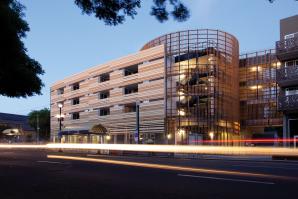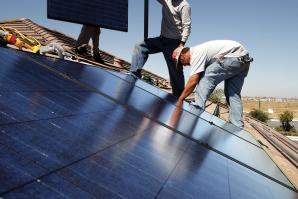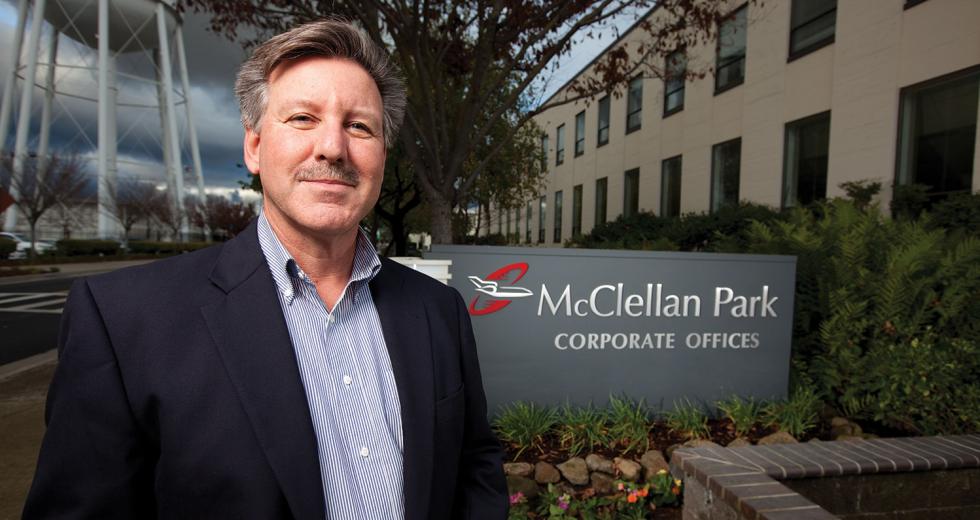Once a U.S. Air Force base populated by concrete buildings and gun-toting soldiers, McClellan is now an eco-friendly business park home to a menagerie of green companies. From SunEdison, the largest solar energy services provider in North America, to Thrift International, whose mission is to transport used clothing to people in Africa and India, McClellan’s bevy of green businesses is diverse.
Now 14 green companies lease space at McClellan Business Park, including two solar companies: SunEdison and South Korea-based N Solar Inc., a photovoltaic panel manufacturer. Slated to open its manufacturing plant at McClellan in 2011, Roseville-based Solar Power Inc. has sidelined its plans because of funding. McClellan is now in negotiations with another four green-tech companies and 10 more have expressed interest in moving to the business park.
Ken Giannotti, senior vice president of marketing and leasing at McClellan, says green companies are the future of business. Through eco-friendly building practices, he says he hopes to add more green businesses to McClellan’s portfolio.
“When we complete tenant improvements here, we aim to do them in an energy efficient way whether that means replacing windows or putting in efficient heating and cooling systems,” Giannotti says. “We’re working hard to make sure the materials we use are sustainable, reusable and have a longer life.”
Another of McClellan’s green tenants, Advanced Data Centers, houses servers for Internet infrastructure. It’s one of five corporate data centers nationwide that’s platinum precertified by the Leadership in Energy and Environmental Design program, which is administered by the U.S. Green Building Council. The data center earned the highest rating for its building and operations, which promote water conservation, energy efficiency, eco-friendly building materials and indoor environmental quality.
McClellan’s success in drawing renewable energy and recycling companies is partly because of its willingness to retrofit each building to accommodate the specific needs of the tenant. The second piece of the puzzle is McClellan’s partnerships with the Sacramento Municipal Utility District, Sacramento County Office of Economic Development and the Sacramento Housing and Redevelopment Agency, which bring a range of solutions to fulfill energy, housing and funding needs.
“We come together and do a lot of listening to the company to understand what they’re looking for in terms of a facility, power needs and overall costs,” says Rob Leonard, director of the Sacramento County Office of Economic Development and Intergovernmental Affairs. “Then we work to put together a competitive package.”
If it’s more power that a company needs, SMUD may offer a solution; funding to retrofit a building might come from the Sacramento Housing and Redevelopment Agency. Also, because McClellan is a former U.S. Air Force base, it’s a designated Local Agency Military Base Recovery Area. Providing tax incentives and education and employment benefits to employers, this designation was created to stimulate growth and development on California’s closed military bases.
“We were able to get the amount of power we needed at McClellan,” says Michael Cohen, president of Advanced Data Centers. “They have helped us in working with the county, helped us in our efforts to receive grants and have improved a number of the physical assets on the site that are important for us.”
The symbiotic relationship between McClellan, SMUD and Sacramento County is because of McClellan President Larry Kelley and Alan Hersh, senior vice president of planning, environment and engineering. Leonard says he doesn’t have the same working relationship with the former Mather Air Force Base and the Army Depot — the county’s other closed military bases — that he has with McClellan.
Attracting renewable energy and recycling companies isn’t the only way the business park’s management team strives to be green. Working to conserve and recycle everything from water and energy to building materials, McClellan’s staff is always looking ahead.
“It’s our goal to be a leader in the region with new technology, systems and designs that minimize our impact to the environment whether that be water, electricity or impacts to the air,” Hersh says.
One parking lot cover made from 544 photovoltaic solar panels not only protects cars at McClellan from the sun, but also generates energy that’s sold to SMUD’s grid. Plus they have worked with Sacramento Suburban Water District to design parking lots and landscapes that reroute rainwater to maintain foliage and filter contaminates before flowing to streams. And all plants chosen for landscaping at McClellan have low-water needs.
To save on energy costs, McClellan has installed 2 million square feet of energy-efficient reflective roofing. Another 800,000 square feet will be installed on buildings this year. All lighting on the grounds and in buildings is energy efficient and maintenance crews use electric golf carts for short trips around the park.
Most noteworthy, though, is McClellan’s dedication to recycling building materials. At an onsite recycling facility, concrete from old military buildings is crushed for reuse in roads, walkways, parking lots and building foundations throughout the business park. To date, McClellan has recycled 20,000 tons of building, roadway, sidewalk and construction waste.
McClellan staff also recycles soil from the previous military base by burning it to clean it of contaminates in a process that makes it suitable for reuse. The treated soil can then be used to fill a site for a future parking lot or roadway.
“I think that has dramatic benefits for everyone because you’re not creating a permanent grave for contaminated soil at some landfill,” Hersh says. “And you don’t have the army of trucks driving it there.”
Recommended For You

Green for Green
Alternative financing for sustainable development
Developers looking to build in the Capital Region are finding cash in emerging green-financing products.

A Slow Pace?
Some programs for green retrofits remain in limbo
There’s a lot of legal hubbub in California surrounding Property-Assessed Clean Energy programs. Also known as PACE, the programs could be headed for troubled waters.



